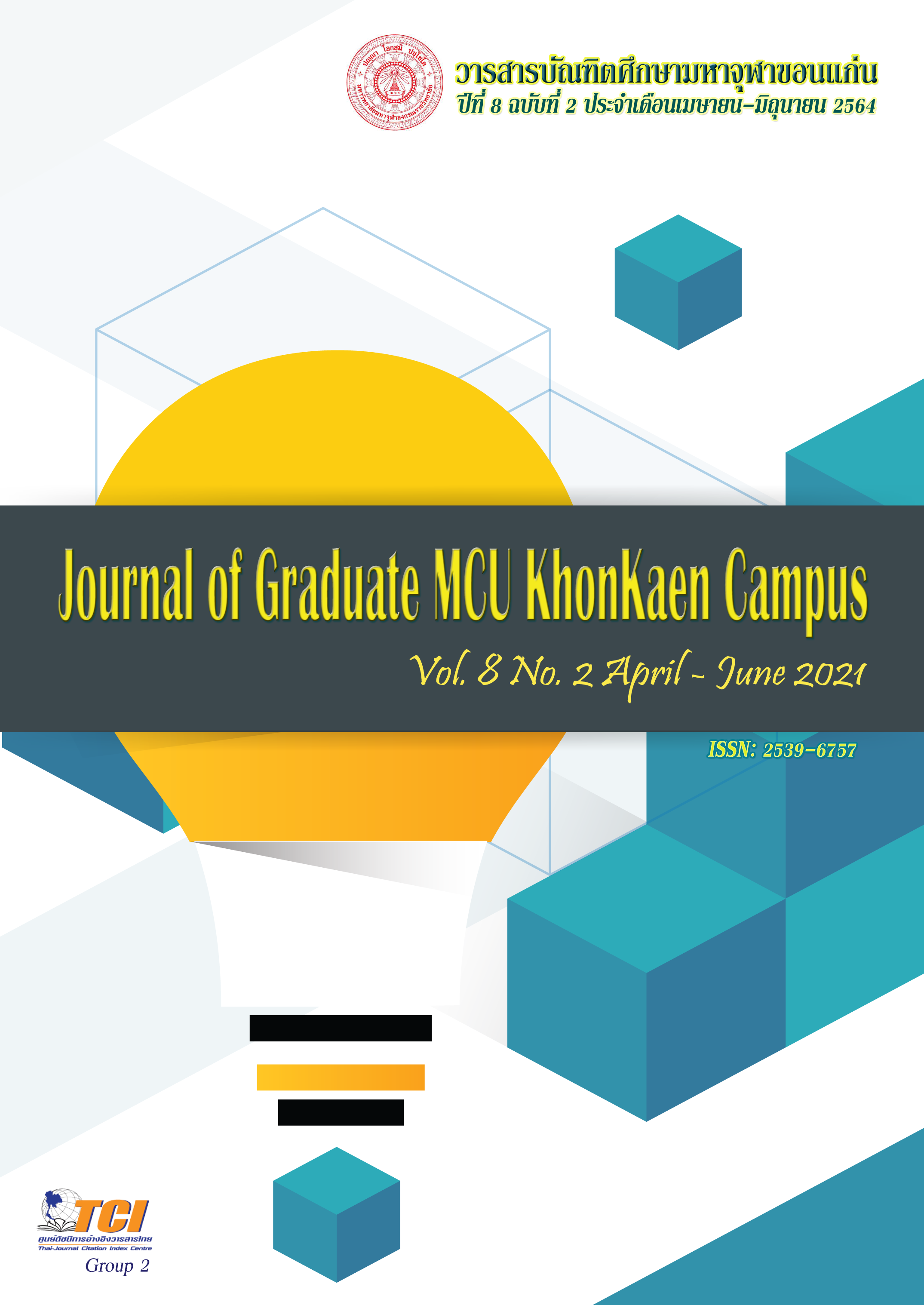HUMAN BEHAVIOR DEVELOPMENT ACCORDING TO BUDDHIST ETHICS IN THA SONG KHON SUBDISTRICT, MUEANG DISTRICT, MAHA SARAKHAM PROVINCE
Main Article Content
Abstract
The objectives of this research were: 1) to study human behavior according to
Buddhist ethics; 2) to study the human behavior according to Buddhist ethics in Tha Song Khon Sub-district, Muang District, Mahasarakham Province; 3) to study the ways to develop the human behavior according to Buddhist ethics in Tha Song Khon Sub-district, Muang District, Mahasarakham Province. This study was a qualitative research carried out by
studying information from the Tripitaka, documents and related research. There were 41 key informants. The obtained data were analyzed by the descriptive approach based on the inductive method.
The research results were as follows:
1) Buddhist ethics is a practice to control and develop human behavior. It is a
criterion for judging the goodness of human beings and a measure of ethical standards, classified into 3 levels: the elementary level of Buddhist ethics referred to the precepts, the middle level referred to the Ten Wholesome Actions, the high level referred to the Eightfold Paths. This makes good behavior and develop ethical reasoning along with behavioral
development.
2) In Buddhist ethics conditions of Tha Song Khon Sub-District people, it was found that there were three groups of Buddhist ethics violating behaviors: behavior violating moral rules because of ignorance and willfulness. The development of human behavior according to the Buddhist ethics in Tha Song Khon Subdistrict was developed according to the Five Precepts by the development of the Five Precepts and Five Ennobling Virtues, Behavior development for groups with problems, factor management contributes to
behavioral development, using community measures to control behavior and well-being behavior development.
3) Human behavior development guidelines according to Buddhist ethics can be made by using Buddhist ethics as the determining way of life and creating norms for the system of community ethics mechanism, applying Buddhist ethics suitable o the community context, humanitarian development and skills in using Buddhist ethics to develop behavior according to the problem state and use it as a social security, developing ethical reasons while managing factors contributing to Buddhist ethics resulting in good behavior supportive coexistence and developing the potential of valuable human resources.
Article Details
References
จินตนา บุญบงการ. (2553). จริยธรรมทางธุรกิจ. (พิมพ์ครั้งที่ 13). กรุงเทพมหานคร: บริษัท ด่านสุทธาการพิมพ์.
ธนภณ สมหวัง. (2540). ความคิดทางจริยศาสตร์และการประยุกต์ใช้กับการศึกษาไทยในทัศนะของพระธรรมปิฎก (ประยุทธ์ ปยุตฺโต). รายงานการวิจัย, มหาวิทยาลัยศรีปทุม.
รสสุคนธ์ ศุนาลัย. (2555). แนวทางการเสริมสร้างจริยธรรมของผู้ประกอบการวิชาชีพด้านการสื่อสารและสารสนเทศ. รายงานการวิจัย, มหาวิทยาลัยราชภัฏสวนสุนันทา.
วรรณลักษณ์ เมียนเกิด. (2557). การปฏิบัติการดูแลและคุณค่าทางจริยธรรมในการดูแลผู้สูงอายุของผู้ดูแลตําบลบางสีทอง จังหวัดนนทบุรี. ปรัชญาดุษฎีบัณฑิต. ใน วิทยาลัยสหวิทยาการ: มหาวิทยาลัยธรรมศาสตร์.
สำนักงานคณะกรรมการพัฒนาการเศรษฐกิจและสังคมแห่งชาติ. (2559). แผนพัฒนาเศรษฐกิจและสังคมแห่งชาติ ฉบับที่ 12. สำนักงานคณะกรรมการพัฒนาการเศรษฐกิจและสังคมแห่งชาติ.
สำนักงานคณะกรรมการพัฒนาการเศรษฐกิจและสังคมแห่งชาติ. (2561). ภาวะสังคมไทยไตรมาสสามปี 2561(ปีที่ 16 ฉบับที่ 4 เดือน พฤศจิกายน). สืบค้นเมื่อ 2 มีนาคม 2564, จากhttps://www.nesdc.go.th/ewt_w3c/ewt_dl_link.php?filename=social&nid=10926
โสวิทย์ บำรุงภักดิ์. (2556). จริยศาสตร์. ขอนแก่น: เอ็มมี่ ก๊อปปี้ เซ็นเตอร์.

